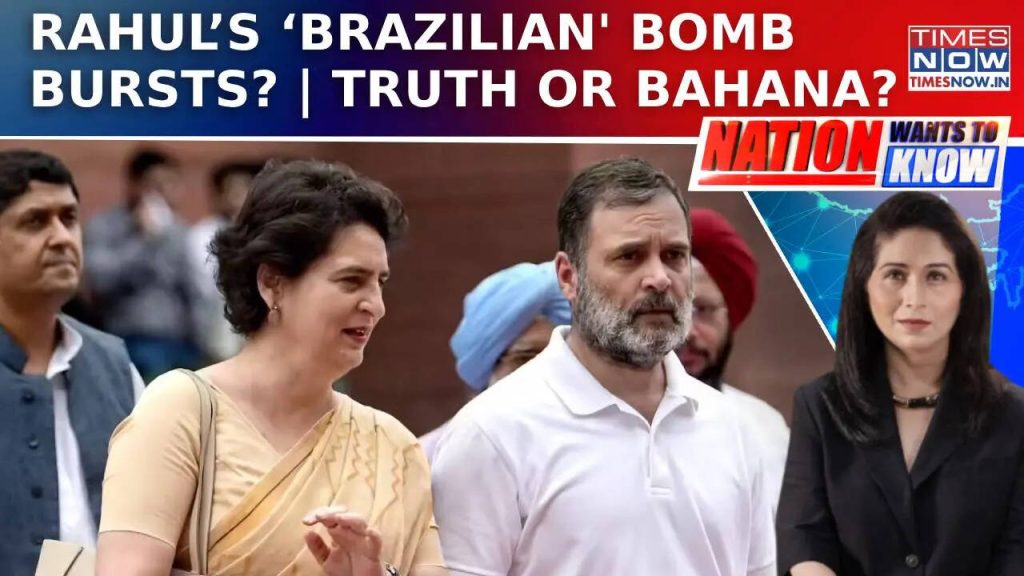Listen to the article
Recent revelations about Rahul Gandhi’s ‘H-Files’ exposé have ignited a significant controversy across India’s political landscape, with competing claims about electoral integrity threatening to reshape public discourse ahead of upcoming polls.
The Congress leader’s allegations, which suggest widespread irregularities in voting patterns, came under intense scrutiny this week after a Times Now investigation challenged the veracity of evidence presented by the opposition figure. According to the news channel’s fact-check report, only 7 out of 22 voters Gandhi presented as evidence of “bulk voting” could be verified as genuine model cases, casting doubt on the broader accusations.
The allegations focus on what Gandhi described as systematic manipulation of electoral processes, particularly in Bihar, where he claimed to have uncovered patterns suggesting electoral fraud. During his presentation of the so-called ‘H-Files,’ Gandhi had presented documentation and testimonials that he argued demonstrated clear evidence of voting irregularities benefiting the ruling Bharatiya Janata Party (BJP).
“I have 101% proof,” Gandhi insisted during a press conference following the initial allegations, doubling down on his claims despite growing criticism from political opponents. “These files contain irrefutable evidence that democracy is being undermined through systematic manipulation.”
The BJP wasted no time in launching a counteroffensive, with party spokespersons dismissing Gandhi’s claims as “a bundle of lies” manufactured for political gain. Senior BJP leaders argued that the opposition was attempting to create a narrative of institutional failure to explain away potential electoral defeats.
“This is characteristic behavior from the Congress party,” said a senior BJP minister who requested anonymity. “When they sense defeat at the polls, they begin questioning the very democratic system that has served India for decades.”
Political analysts note that this confrontation comes at a particularly sensitive time in Indian politics, with several state elections on the horizon and national elections looming large. The timing suggests strategic calculations from both sides, with the opposition attempting to sow doubt about electoral integrity while the ruling party works to maintain public confidence in democratic institutions.
The controversy has been particularly prominent in Bihar, where political allegiances remain fluid and electoral outcomes often hinge on narrow margins. The state’s significance in national politics makes it a frequent battleground for competing political narratives.
Dr. Sandeep Kumar, a political scientist at Delhi University, explained: “What we’re witnessing is not just a dispute about facts but a contest over who controls the narrative about democracy in India. Both sides recognize that public perception about electoral integrity can influence voter turnout and preferences.”
Media coverage of the dispute has further complicated matters, with different outlets presenting diverging interpretations of the same evidence. The Times Now fact-check represents just one evaluation of Gandhi’s claims, though its prominence has given significant weight to skepticism about the opposition leader’s allegations.
Electoral experts point out that claims of voting irregularities are notoriously difficult to substantiate definitively, requiring extensive forensic evidence and witness testimony. The burden of proof typically falls heavily on those making such accusations, particularly when they involve suggestions of systematic manipulation.
The Election Commission of India has yet to issue a formal statement addressing Gandhi’s specific claims, though the body has consistently maintained that India’s electoral system contains robust safeguards against fraud.
As the controversy continues to develop, political observers note that the ultimate impact may depend less on the factual accuracy of specific claims than on how effectively each side communicates its narrative to voters. With trust in institutions already under strain in many democracies worldwide, the dispute highlights the increasing politicization of electoral processes themselves.
Whether Gandhi’s ‘H-Files’ represent compelling evidence of wrongdoing, political theater, or something in between remains contested. What is clear, however, is that questions about electoral integrity will continue to shape India’s political discourse in the months ahead.
Fact Checker
Verify the accuracy of this article using The Disinformation Commission analysis and real-time sources.




10 Comments
Curious to see how this story develops. Fact-checking and objective analysis are essential to cut through the political noise and determine the facts.
Yes, we need to rely on credible, non-partisan sources to understand the full context and implications here.
This is a complex issue with competing claims. It’s important to have a thorough, impartial investigation to get to the truth and ensure the integrity of India’s electoral process.
I agree, transparency and accountability are critical for maintaining public trust in democratic institutions.
While the allegations of voting irregularities are concerning, the fact-check findings raise questions about the reliability of the evidence presented. A more rigorous, independent review may be warranted.
Absolutely, any claims of electoral fraud need to be backed by verifiable data and subjected to robust scrutiny.
Given the high stakes and polarized political environment, it will be critical for all parties to approach this issue with utmost care and objectivity. Transparency and due process must be the guiding principles.
Well said. Rushing to conclusions or making unsubstantiated claims will only undermine public trust in the system.
This highlights the importance of strong election safeguards and oversight mechanisms to protect the integrity of the democratic process. Rigorous verification of voter rolls and voting records is crucial.
I agree, ensuring the fairness and legitimacy of elections should be a top priority for all stakeholders.